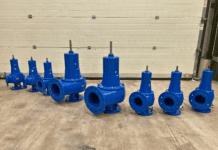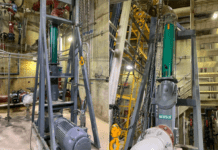Pump manufacturer Börger discusses three recent applications showcasing the use of pumps in challenging environments
Two rotary lobe pumps are proving their continued reliability and durability with a UK firm that deals with industrial waste disposal, cleaning and hazardous waste management, according to manufacturer Börger.
Black Country-based MTB Midlands introduced the Börger equipment in 2009 to replace two troublesome progressive cavity pumps that couldn’t cope with the arduous applications.

Richard Owen from MTB Midlands said the pumps are used constantly on a day to day basis, continuing to work effectively with oil, coolants and process waters, the pumps keep on working, which “enables us to concentrate on what we’re doing and maintain a very efficient and effective operation, with very little down time for pump maintenance”.
Designed with Maintenance-In-Place (MIP), the 4kW and 7.5kW Borger pumps (15 & 50 m3/h @ 3-bar) are both fitted with pressure relief valves.
Highly abrasive waste application
Reductions in downtime are also attributed to the use of Börger’s pumps at Chemwaste, a firm offering total waste management solutions. Here, “one of the most notoriously difficult applications” has seen the deployment of three Maintenance-In-Place Börger pumps handling highly abrasive waste latex with a high solids content, part of the company’s six-stream manifold system.
Chemwaste’s Site Manager Dave Walton, said: “We’ve worked closely with Börger to develop pumps that would be best able to withstand our very demanding process. Börger’s pressurised pre-chamber system pump has dramatically reduced downtime because our previous pumps became blocked up almost constantly and had to be taken out of service for complete stripping down”.
David Brown, Börger UK’s Managing Director, added: “We knew this application was going to be an extremely tough challenge but by Chemwaste giving us the opportunity to work with them and understand their process, we’re very pleased to have provided pumps that make life easier”.
Breakdown busting deployment at ink maker
Börger’s pumps have also been introduced at a major West-Midlands-based ink provider, where laborious pump breakdowns were proving all too common. Failure of just one of the 150 pumps at the ink plant could result in the loss of 6-7 tonnes of product per day, with a repair taking up to 2-3 hours, as engineers working in confined areas fought to keep production on track. The older pump design would require all sorts of ratchets and adjustable spanners just to get the pump going again or sometimes remove it completely to the workshop. Hoisting out an ink-clogged pump and dragging it off to the workshop was a major event. This very time-consuming process was being further hampered by painfully long waits for spares of sometimes up to 6 weeks.
Results with Börger were said to be instant. Trialling just one Borger pump de-bottlenecked the troublesome black ink production line. It also improved quality due to its consistent running – and comfortably took the company beyond its capacity-analysis target to give an extra 400 kilos of ink production per hour – the best ever seen at the facility.
Encouraged by this success, the ink producer began introducing one Börger pump for each process, which continued to enhance production and buoyed the maintenance team. The 2-3 hours spent on the laborious repair of an old pump had given way to just 10-20 minutes upkeep with a screwdriver on Börger’s MIP (Maintenance in Place) pumps.
On the older pumps, blockages would stop the pumps’ lobes from turning and the pressure relief valves would regularly clog up – whereas with Börger’s Variocap, there’s an anti-clogging element and no external pipework. After the integrated pressure relief system has operated, it pushes the product back into the pump, which also improves the safety of the plant. Furthermore, energy savings have been created because typically, pumps in the past had been over-specified. Standardisation has begun on the 3kW Borger pumps, which are gradually replacing the unreliable 7.5kW units.
David Brown, Börger’s Managing Director said: “This is just one of many examples where we’ve joined forces to find the best solution. It’s an education process for both parties, understanding the kit and what’s trying to be achieved”.







